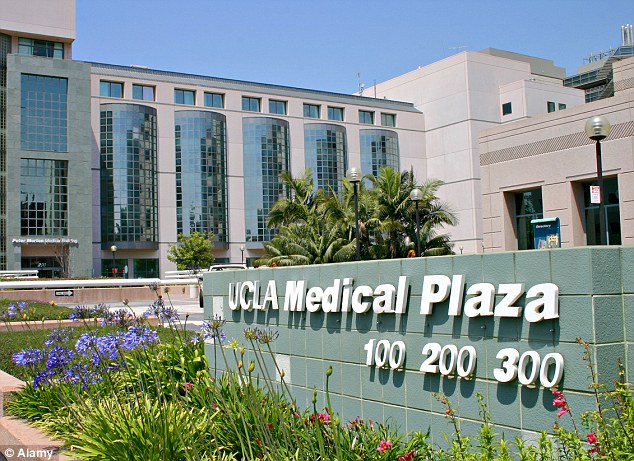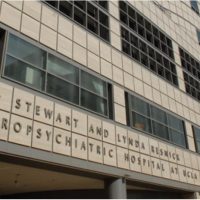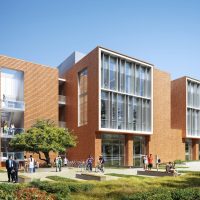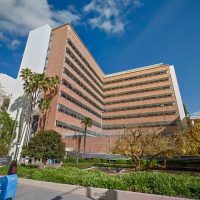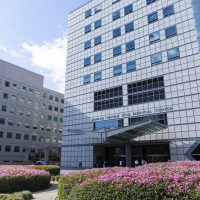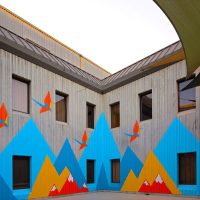Child & Adolescent Psychiatry Fellowship Program
The UCLA Jane and Terry Semel Institute for Neuroscience and Human Behavior’s Child and Adolescent Psychiatry Fellowship Training Program promotes clinical excellence, curiosity, and compassion as we prepare the next generation of child psychiatry leaders to advance the knowledge and treatment of mental illness one child, family, system, and community at a time. We seek to ensure clinical competency while providing unique opportunities to learn about pioneering neuroscience, ground-breaking somatic and psychotherapeutic treatments, and population health from world-renowned faculty members. Our training program strives to address mental health disparities and serves a diverse patient population that draws from the local Los Angeles and Southern California region while also serving as a referral center for patients and families worldwide.
Year 1
The first year of child psychiatry fellowship includes three 4-month hospital-based rotations.
Child & Adolescent Psychiatry Inpatient Service
Location: The Stewart and Lynda Resnick Neuropsychiatric Hospital at UCLA (RNPH)
Inpatient Faculty: Artha Gillis, M.D., Ph.D., Brandon Ito, M.D., MPH, Manal Khan, M.D., Jenny Nguyen, M.D., Krista Tabuenca, Ph.D., Sabrina Reed, M.D., M.A.
The Child and Adolescent Psychiatry Inpatient Service is where fellows become part of one of the best inpatient multidisciplinary teams in the nation, gaining clinical experience in the management of severe child and adolescent psychiatric disorders side by side experienced psychiatrists, psychologists, social workers, occupational therapists, nurses, educational specialists, recreational therapists and more. Fellows provide individual psychotherapy and medication management for patients typically ranging from 10-17 years old, in addition to family therapy and parenting support. Case conferences as well as individual and group supervision contribute to fellows’ training during this rotation.
During this 4-month rotation, fellows will:
- Serve as case coordinator and manage all aspects of treatment for children and adolescents on the inpatient wards including individual psychotherapy, psychotropic medication, and at least one family therapy session per week, typically with the social worker as co-therapist.
- Be responsible for psychiatric management and psychosocial interventions for acute patients presenting with childhood disorders such as mood and anxiety, psychotic, substance related, eating, somatoform, and sleep;
- Provide treatment for school-aged and adolescents from diverse cultures, using treatment modalities including family therapy, group therapy, supportive, psychodynamic, cognitive behavior therapy (CBT), and psychopharmacologic therapy
- Collaborate with other professionals and learn such skills as interpreting psychological testing, assessing school, legal, and community needs.
ABC Young Child Partial Program KidsConnect (Early Childhood PHP)
Location: UCLA Semel Institute
ABC Faculty: Benjamin Schneider, M.D. and Tara Peris, Ph.D.
KidsConnect Faculty: Tanya Paparella, Ph.D., Stephanny Freeman, Ph.D., Robert Suddath, M.D.
It is on the ABC rotation where fellows fully delve into the world of young children and learn the fundamentals of evaluating and treating children 6-12 years old in a partial hospital setting. Our young patients present with a wide variety of psychological and developmental conditions such as Autism Spectrum Disorders, ADHD, OCD, Anxiety and Mood Disorders, genetic syndromes, and challenging difficulties with impulse control and emotional regulation. Fellows will coordinate the care of child partial hospital patients through treatment planning meetings, psychiatric attending rounds, and learning how to conduct family and parent training sessions in addition to psychotherapeutic strategies that have been proven effective with children. In addition to cases on the ABC service, fellows will also observe younger children with Autism and other developmental disabilities in the KidsConnect, learning about how therapeutic environments and individualized strategies can help to improve behaviors and communication and socialization.
During this 4-month rotation, fellows will:
- Evaluate school-aged patients with diagnoses including those first diagnosed in childhood, mood, and anxiety disorders;
- Provide treatment of preschool and school-aged children from diverse cultures and varied sociodemographic backgrounds
- Be exposed to treatment modalities of family therapy, group therapy, supportive therapy, CBT for children, and childhood psychopharmacology; collaboration with other professionals; other experiences such as psychological testing
- Consult with pediatricians, schools, regional centers, and other community agencies
Pediatric Consultation-Liaison Psychiatry Emergency Psychiatry
Location: UCLA Mattel Children’s Hospital and Ronald Reagan UCLA Medical Center
Faculty: Jena Lee, M.D., Natacha Emerson, Ph.D., Sabrina Reed, M.D., M.A.
On the CL-ED Rotation, fellows learn the art of being a child psychiatric consultant to pediatric teams for children admitted to the UCLA Mattel Children’s Hospital and to the Emergency Department at the Ronald Reagan UCLA Medical Center. In their role as consultant to Pediatrics, first year fellows complete comprehensive consultations of medically ill children in the inpatient hospital setting. They learn to evaluate consultation requests, manage the physical, interpersonal, and system issues inherent to the psychiatric consultant in a pediatric setting, differentiate pathological from normal behavioral and emotional responses to a medical illness, and work with a multidisciplinary team to devise appropriate treatment plans for children. As consultants to the Emergency Department, fellows learn how to efficiently and effectively assess and manage children and adolescents presenting with acute psychiatric symptoms, including symptoms that can be the initial presentations of chronic and severe psychiatric conditions. Fellows become adept at discerning level of safety risk, managing acute behavioral aggression, legal issues that impact psychiatric care of youth, and medical conditions that can influence psychiatric symptoms.
During this 4-month rotation, fellows will:
- Evaluate preschool, school aged, and adolescent youth who first present to pediatrics or emergency department teams with disorders including adjustment, trauma, mood and anxiety, psychotic, substance related, feeding/eating, somatic symptom, and sleep, or those who undergoing a transplant.
- Provide treatments including crisis intervention, psychoeducation, supportive therapy, parenting and behavioral interventions, coping skills training, and psychopharmacologic treatment recommendations
- Collaborate with pediatricians, emergency physicians, other staff and mental health professionals in managing childhood psychiatric emergencies, acute seriously emotionally disturbed patients, and preschool, school aged, and adolescent youth who are experiencing medical trauma and stress.
Year 2
The second year of child psychiatry fellowship consists of rotations in both general and specialty child psychiatry outpatient clinics as well as protected time for electives.
Second-year fellows see patients in the Pediatric Psychopharmacology Clinic one-half day per week for 12 months.
Pediatric Psychopharmacology Clinic
Location: 300 Medical Plaza
Director: Bonnie Zima, M.D, Ph.D., Melita Daley, M.D., Ph.D.
The Pediatric Psychopharmacology Clinic (PPC) provides child and adolescent psychiatric assessment and psychopharmacological treatment for a wide range of childhood psychiatric illnesses, ranging from disruptive behavior disorders such as ADHD, to mood disorders such as anxiety, bipolar and depressive disorders. Additionally, fellows will learn how to manage patients with behavioral problems related to Autism and other neurodevelopmental disorders, as well as treat childhood tics, sleep abnormalities, and prodromal psychosis.
Fellows learn to do focused diagnostic assessments of youth presenting for general psychiatric care. In coordination with UCLA and community providers who are supporting patients with psychotherapeutic interventions, fellows provide psychopharmacological treatment that they learn to initiate and maintain over the course of their second year of fellowship.
As part of PPC, fellows participate in two didactic activities. Fellows actively participate in a journal club that facilitates critical reading of pertinent clinical trials in the literature pertaining to child and adolescent pharmacology. A major emphasis will be the critical review of various types of medical literature to provide an evidence base for rational pharmacotherapy. A second focus will be the participants’ development of an ethically grounded clinical decision– making process given the limited scientific evidence supporting pharmacological practice in the field.
Another didactic series in PPC is The Advanced Research Literacy Seminar, which is an extension of the Research Literacy Seminar taught during the first-year child psychiatry core didactic series. This seminar builds upon the first-year course, by continuing to reinforce skills in the critical reading of child psychiatric research and the application of scientific evidence into clinical decision making.
They also see children and adolescents for evaluations and treatment in five specialty clinics, for one-half day per week for 6 months:
The Max Gray Child & Adolescent Mood Disorders Program (CHAMP) Clinic
Location: UCLA Semel Institute, 760 Westwood Plaza
Directors: David Miklowitz, Ph.D., Patricia Walshaw, Ph.D.
The CHAMP clinic provides diagnostic evaluations, second opinion consultation, and short-term treatments (medication management and various forms of psychotherapy) for youth who have symptoms of significant and impairing mood disorders along with supports for their families, with a focus on pediatric bipolar disorder.
Dr. David Miklowitz, the developer of Family Focused Therapy for Bipolar Disorder (FFT), trains fellows in this evidence-based treatment for families with a child who has bipolar disorder. Fellows benefit from in-vivo supervision with the CHAMP team of experts in FFT and other psychotherapies.
Dr. Patricia Walshaw teaches fellows how to conduct a comprehensive, semi-structured diagnostic assessment of youth, using the Kiddie Schedule for Affective Disorders and Schizophrenia (K-SADS) and how to provide feedback to the family about recommendations for treatment.
Drs. Elizabeth Horstmann and Robert Suddath provide teaching and supervision on psychopharmacology assessment and treatment of these complex children and adolescents.
For more information about the Max Gray CHAMP services, please click here.
The UCLA Childhood OCD, Anxiety & Tic Disorders Program
Location: UCLA Semel Institute, 300 Medical Plaza
Directors: John Piacentini, Ph.D., Julia Cox, Ph.D., LCP
The UCLA Childhood OCD, Anxiety & Tic Disorders Program is a clinical research program that specializes in the evaluation and treatment of anxiety and related problems in children and adolescents. The primary goal of this clinic is to provide effective treatments for children suffering from anxiety disorders, including Obsessive-Compulsive Disorder (OCD), Selective Mutism (SM), Tic Disorders, Social Phobia, Generalized Anxiety Disorder (GAD), Separation Anxiety Disorder (SAD), and Trichotillomania.
Fellows learn evidence-based cognitive behavioral therapy techniques from Dr. Piacentini and other faculty whose research in pediatric anxiety disorders is directly applied in clinic. Fellows will learn how to build fear hierarchies with patients, engage in exposure and response prevention, teach their patients with tics habit reversal therapy, and help all patients value mindfulness techniques such as guided visualization, deep breathing, and progressive muscle relaxation.
For more information, please click here.
Stress, Trauma, & Resilience (STAR) Clinic
Location: UCLA Semel Institute, 760 Westwood Plaza
Directors: Natalia Ramos, M.D., Catherine Mogil, PsyD, Blanca Orellana, Ph.D.
The STAR Clinic provides evaluation, consultation, and treatment services for children and family members affected by trauma and other challenging events, including medical illness, traumatic loss, community violence, disasters, and combat deployment stress. Comprised of a team of psychiatrists and psychologists specializing in children and adolescents, the clinic provides expertise in child and family traumatic stress for children of all ages and their family members.
Fellows gain experience in a family resilience approach to prevention, early intervention, and treatment for youth and their families and learn a variety of evidence-based treatment strategies that are informed by an understanding of the role of traumatic stress on health and wellbeing. During this rotation, fellows also learn about promoting the mental health of LGBTQ youth and young adults, through the EMPWR Program (Promoting Well-Being and Resilience for LGBTQ Youth).
Dr. Patricia Lester, the developer of Families OverComing Under Stress (FOCUS), and other STAR faculty train fellows in the core components of this family intervention, in addition to other trauma-informed interventions such as Trauma-Focused CBT and Parent-Child Interaction Therapy (PCIT).
For more information about STAR, please click here.
For more information about EMPWR, please click here.
Child & Adult Neurodevelopmental (CAN) Clinic / Pediatric Neurology
Location: UCLA Semel Institute, 300 Medical Plaza
Directors: Benjamin Schneider, M.D. and Amanda Gulsrud, Ph.D.
The Child and Adult Neurodevelopmental (CAN) Clinic provides multidisciplinary assessments and evidence-based treatment for children, adolescents, and adults with neurodevelopmental conditions and social development impairments related to autism spectrum disorder (ASD), developmental delays, and genetic conditions.
Fellows learn comprehensive evidence-based assessment and treatment approaches for youth with neurodevelopmental disorders. Each clinic begins with a multidisciplinary meeting with in-depth discussion of cases.
Pediatric neurology is also an integral part of the CAN Clinic rotation during the second year of fellowship, where fellows learn alongside expert research clinicians and pediatric neurologist, Dr. Rujuta Bhatt Wilson, as well as with Dr. Derek Ott a child psychiatrist who specializes in neuropsychiatric illnesses and developmental disabilities.
For more information about CAN, please click here.
Augustus F. Hawkins Family Mental Health Center
Location: 1720 E. 120th St. Los Angeles
Directors: Kira Williams, M.D., Vernon Rosario, M.D.
Located in South Los Angeles, the Augustus F. Hawkins Family Mental Health Center is a Los Angeles County Department of Mental Health clinic that provides comprehensive public outpatient psychiatric care to a diverse under-resourced population of primarily African American and Latinx children and their families. They present with a wide variety of disorders ranging from mood, disruptive behavioral, learning, posttraumatic stress, anxiety, psychotic and developmental disorders.
Fellows work with UCLA clinical faculty who have extensive expertise in community psychiatry. They learn about important cultural and social determinants of mental health and work closely with the clinic staff in coordinating existing resources.
For more information about the Los Angeles County Department of Mental Health, please click here.
Finally, second-year fellows participate in 3 shorter term rotations:
Integrated Behavioral Health Clinic
Location: Behavioral Health Associates, 11318 National Blvd., Los Angeles, 310-231-9150
Director: Jessica Jeffrey, M.D., M.P.H., M.B.A.
Behavioral Health Associates is an evidence-based, integrated care program operated as part of UCLA Health. Embedded BHA providers work collaboratively with primary care physicians to provide behavioral healthcare to patients. BHA offers psychiatric consultation and medication management by psychiatrists, short-term therapy (individual, couples, group) from master’s level therapists, and care coordination services. E-consultation to a psychiatrist is also available for primary care providers.
Fellows will become familiar with integrated care best practices as they diagnose and treat behavioral health conditions within the pediatric integrated care setting. During this rotation fellows will have the opportunity to collaborate with primary care providers and participate in triage and e-consultation. They will also learn about measurement-based care principles and will gain experience utilizing rating scale data to improve individual care.
For more information about the Behavioral Health Associates services, please click here.
School Consultation Rotation
Location: The Stewart and Lynda Resnick Neuropsychiatric Hospital at UCLA (RNPH), school sites
Directors: Karin Best, Ph.D., Ilaina Blum, MA, MFT, Melita Daley, M.D.
During the School Consultation Rotation, fellows will be exposed to a variety of school settings (public, private, general education, non-public schools) and learn about the school climate and culture, resources, and mental health supports for students. Fellows will understand the roles of a child psychiatrist in a school setting and will enhance their skills in consulting to school staff regarding specific patients. They will also learn about types of educational testing, interpreting testing results, and consulting on IEPs.
As part of the case consultation component of the School Rotation, fellows will present their own clinic cases and discuss any assessments, 504 Plans, and/or IEPs that the patient may have. In group supervision with faculty expert in educational assessments and supports, fellows will plan for a school observation of their clinic patient, consult with school staff/teacher, and discuss findings following the visit and next steps.
Forensic Consultation Rotation
Location: Various forensic locations through the Department of Mental Health and Juvenile Mental Health Court
Directors: Eraka Bath, M.D., Hanumantha (Hanu) Damerla, M.D.
Fellows will gain exposure to a wide variety of forensic settings in Los Angeles County, including: Dependency Court, Juvenile Hall, Juvenile Detention Camp, and Juvenile Mental Health Court. Fellows will participate in on-site didactics on essential topics in child forensic psychiatry (including violence, child maltreatment, competency to stand trial, waiver to adult court.). They will gain first-hand training about the role of the child psychiatrist in a variety of forensic settings (evaluator, clinician in a correctional setting, expert witness). They will observe legal proceedings in one of the busiest juvenile justice systems in the country and be exposed to systems of care issues as youth cross between the child welfare, juvenile justice systems and receive care from various systems of care agencies.
Elective Opportunities
In addition to the second-year required rotations above, each fellow can choose one or more elective experiences for at least 5 hours per week.
Areas of Distinction:
- Community-Global Child Psychiatry
- Clinician-Educator
- Psychotherapy with a Psychoanalytic Concentration
- Parent-Infant Mental Health
Chiefships:
- Program Chief: administrative, lead fellowship activities, liaison with division and departmental leadership
- Psychotherapy Chief: administrative, recruit and choose appropriate long-term psychotherapy patients for fellows, coordinate referrals
- Wellbeing Chief: administrative, lead Child Division Fellowship wellness activities and wellness efforts
- Emergency Medicine Chief: administrative, coordinate with multidisciplinary Emergency Department teams, participate in Emergency Department Throughput Committee
- Justice, Equity, Diversity, and Inclusion (JEDI) Chief: helps integrate JEDI principles into all training activities to reinforce the vision and values of our program
- Inpatient Chief: administrative, educational role, medical student, resident, fellow teaching, work closely with inpatient medical director
Regular Opportunities for Electives:
- Adolescent Medicine Clinic (B. Bursch)
- Infant-Preschool Clinic (K. Best)
- Anxiety and OCD outpatient or intensive outpatient (IOP), research (J. Piacentini, S. Chang)*
- CHAMP (Child and Adolescent Mood Disorder Program), bipolar disorder, Family Focused Treatment, clinical or research (D. Miklowitz, R. Suddath)*
- Child and Adult Neurodevelopmental Clinic, clinical or research (J. McCracken)*
- Child OCD Intensive Treatment Program
- Eating Disorders, inpatient/partial (M. Strober)*
- Kids Connect (T. Paparella; S. Freeman, R. Suddath)*
- EMPWR Program for LGBTQ Youth & Young Adults (N. Ramos)
- Family Development Project, maternal mental health, parent-child relationship (C. Mogil)
- Family Therapy (V. Barenstein)
- Juvenile Mental Health Court/ Forensic Psychiatry (B. Bursch; E. Bath)
- Pediatric Psychology CL (N. Emerson)
- Pediatric Trauma, FOCUS (P. Lester)*
- Family Stress, Trauma, and Resilience (STAR), Early Childhood, PCIT (C. Mogil)
- FOCUS Military/Veteran Family Resilience (P. Lester and C. Mogil)
- PEERS, Program for the Education and Enrichment of Relational Skills, for adolescent/TAY with Autism (L. Laugeson)
- Maternal Mental Health Partial Hospitalization Program (M. Richards)
- Primary Care Consultation (J. Jeffrey)
- Psychodynamic Psychotherapy case conference/reading seminar, at the New Center for Psychoanalysis (S. Leiken, V. DeGolia)
- STRIVE, Adolescent and Family Prevention/Intervention for runaway youth (N. Milburn)
- Teaching of Medical Students (M. Richards)
- TIES for Families, working with children in foster care, adoption (M. Daley, A. Langley)
- UCLA Counseling & Psychological Services (CAPS): College mental health (H. Levin, Psychiatry Director).
- Youth Stress & Mood Clinic: Depression & Suicide Prevention (CBT, DBT, clinical and/or research) (J. Asarnow)
- Rape Treatment Center/Stuart House (A. Gillis)
Examples of “Create Your Own” Electives:
- Educational/Psychological Assessments (I. Blum)
- Research Project (various)
- Psychotherapy, individual or group therapy (additional psychotherapy supervisor)
- International/Away Elective (given COVID-19, this elective is on-hold for the 2020-21 academic year)
- Other (design your own, start planning early)
*Electives that can be expanded experiences of required rotations.


